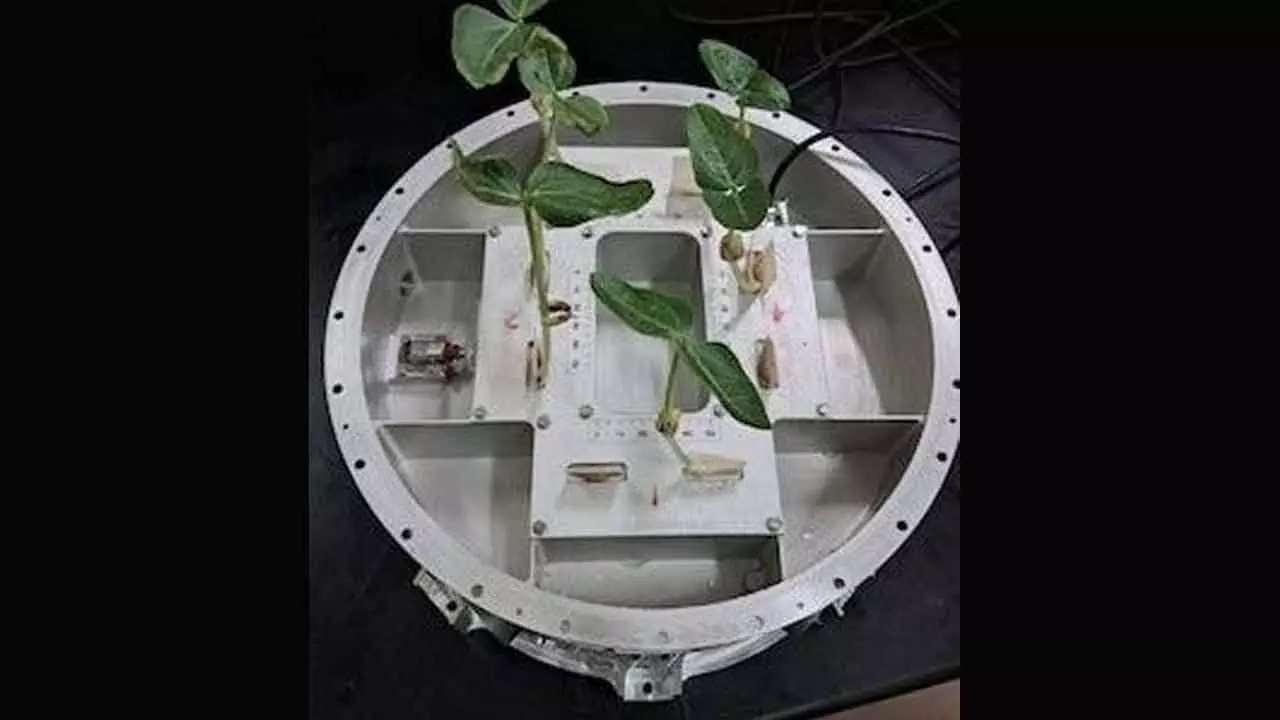Live
- Garena Free Fire MAX Redeem Codes for December 28, 2024: Get Frostfire Bunny Bundle, Rose Emote, and Exclusive Rewards!
- Salman Khan Faces Off Against Samurais in Action-Packed Teaser for 'Sikandar'
- Putin apologises to Azerbaijan's Aliyev for 'tragic' plane crash
- OnePlus Open 2 Leaks: Exciting Upgrades in Design, Features, and Performance
- Pioneering database excellence: Dheeraj Yadav's journey through enterprise data management
- Rajasthan Government Dissolves Nine Districts in Key Cabinet Decision
- HYDRAA's 2024 Report: 5800 Complaints Resolved, 12 Lakes Restored, and 200 Acres Reclaimed in Hyderabad
- Revolutionizing marketplace pricing with Machine Learning: The strategic innovation of Abhijeet Bajaj
- AI-powered transformation in manufacturing: Balachandar Ramalingam's vision for component management excellence
- Mangaluru Kambala 2024 Inaugurated, Showcases Buffalo Racing and More
Just In
IN-SPACe propels start-ups to experiment in space


A record 24 experiments -- 14 by the Indian Space Research Organisa-tion (ISRO) laboratories and 10 by non-government entities (NGEs) --will be...
A record 24 experiments -- 14 by the Indian Space Research Organisa-tion (ISRO) laboratories and 10 by non-government entities (NGEs) --will be carried onboard the PSLV Orbital Experiment Module (POEM), includ-ing a demonstration of seed germination in outer space, a robotic arm to catch the tethered debris there and the testing of green propulsion systems
New Delhi: The fourth stage of the PSLV rocket, which will remain in orbit for some time after launching two satellites on Monday, will give an opportunity to start-ups and institutes to carry out experiments in outer space, with India's space regulator emerging as a common link in turning these pro-jects to reality.
A record 24 experiments -- 14 by the Indian Space Research Organisation (ISRO) laboratories and 10 by non-government entities (NGEs) -- will be carried onboard the PSLV Orbital Experiment Module (POEM), including a demonstration of seed germination in outer space, a robotic arm to catch the tethered debris there and the testing of green propulsion sys-tems. A common link among the payloads of the start-ups and private universities is the technical centre at the Ahmedabad-based headquar-ters of the Indian National Space Promotion and Authorisation Centre (IN-SPACe) -- India's regulator and promoter for the space sector.
"We give them all the support, including the test facilities as well as help from mentors to address any problems," Rajeev Jyoti, Director, IN-SPACe, said.
He said IN-SPACe also enables access to facilities at ISRO work cen-tres for any specific test, such as the outgassing measurement test, the EMI/EMC test and the mechanical shock test, in accordance with the model philosophy and test specification specified by the PSLV. “The tech-nical centre also has facilities, such as a design lab, cleanroom, assembly and integration tools, which NGEs can utilise to prepare the hardware for flight and ship it for final integration on to the flight POEM platform,” Jyoti said.
The ISRO plans to grow eight cowpea seeds from seed germination and plant sustenance until the two-leaf stage in a closed-box environment with active thermal control as part of the Compact Research Module for Orbital Plant Studies (CROPS) developed by the Vikram Sarabhai Space Centre.
The 10 payloads from NGEs comprise a study of various spectra of sci-ence and engineering, such as the growth of spinach plant cells or callus in space from Amity University-Mumbai; green propulsion system thrusters from Bellatrix Aerospace-Bengaluru, another green propulsion using a hydrogen peroxide-based thruster from Manastu Space Technol-ogies-Mumbai.
The payloads also include one to generate, capture and process Synthetic Aperture Radar (SAR) images from GalaxEye Space Solutions-Bengaluru; MEMS-based Inertial Measurement Unit (IMU) sensors and microcontrol-lers for attitude measurement from MIT World Peace University-Pune.
Andhra Pradesh-based Nspace Tech is demonstrating the operational ca-pability of the onboard transmitter by establishing a reliable communica-tion link with the ISRO ground station; Ahmedabad-based Piersight Space will have an in-orbit demonstration of the SAR; RV College of Engi-neering (Bengaluru) will have an experiment for the measurement of growth kinetics of a gut bacterium in space.
Karnataka-based SJC Institute of Technology has a payload to provide Amateur Radio Satellite services globally in collaboration with UPARC (Upagraha Amateur Radio Clubsat, URSC-ISRO) and India’s first Artificial Intelligence Lab (AI lab) in space from Hyderabad-based start-up Take-Me2Space are also among the payloads on the POEM.
Jyoti said IN-SPACe provided handholding through resident experts in the satellite, communication payload, launch vehicle and space remote-sensing application domains. He added that IN-SPACe also provided nec-essary support by identifying the relevant retired ISRO domain experts and connecting them with the NGEs for resolving or mitigating the tech-nical issues, if any, encountered during the validation of the hardware for flight.

© 2024 Hyderabad Media House Limited/The Hans India. All rights reserved. Powered by hocalwire.com






